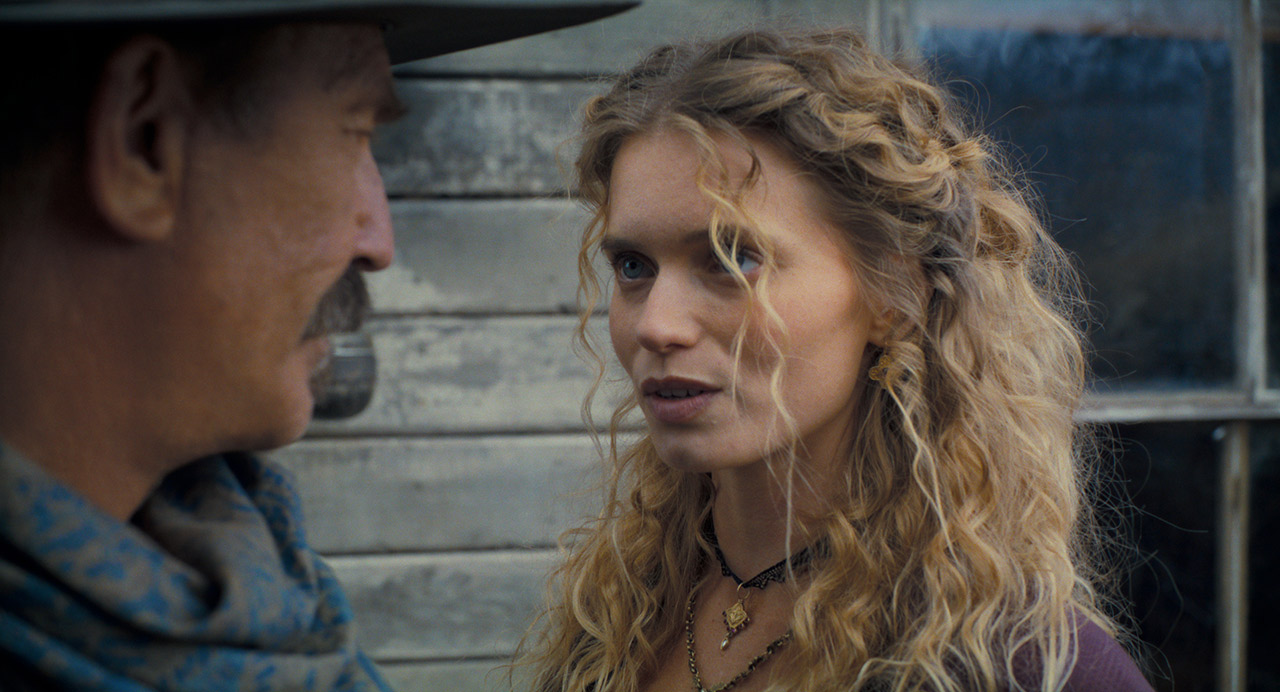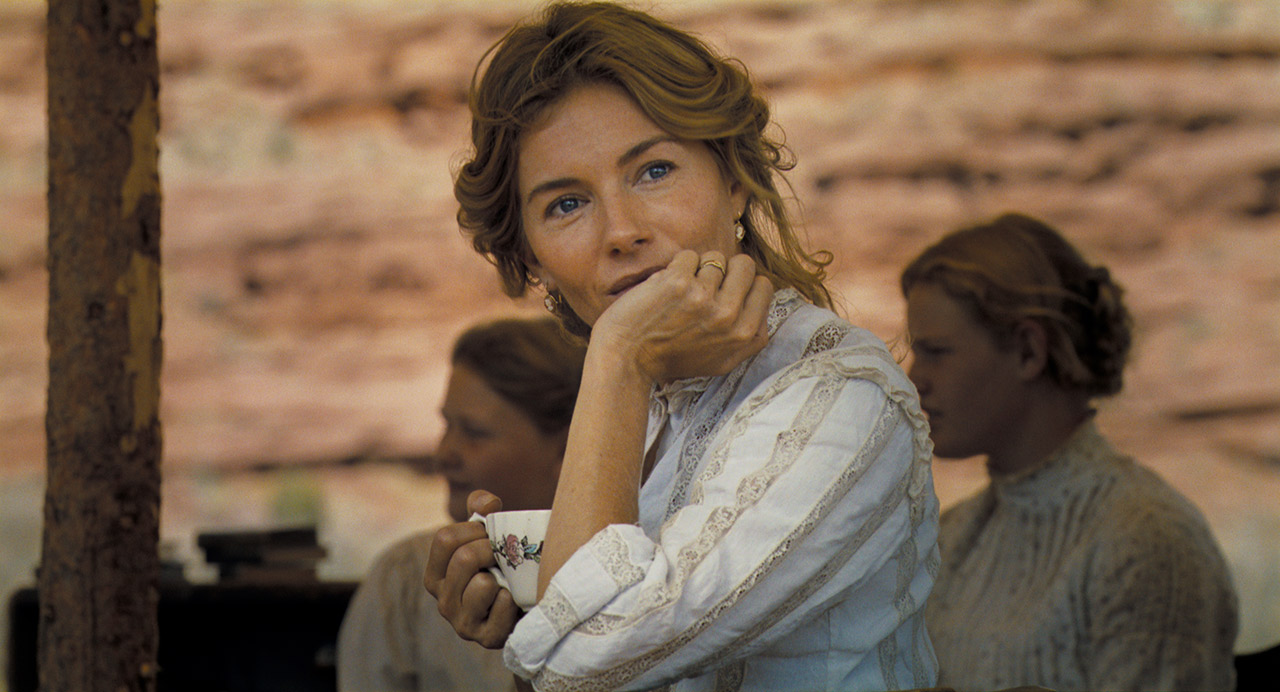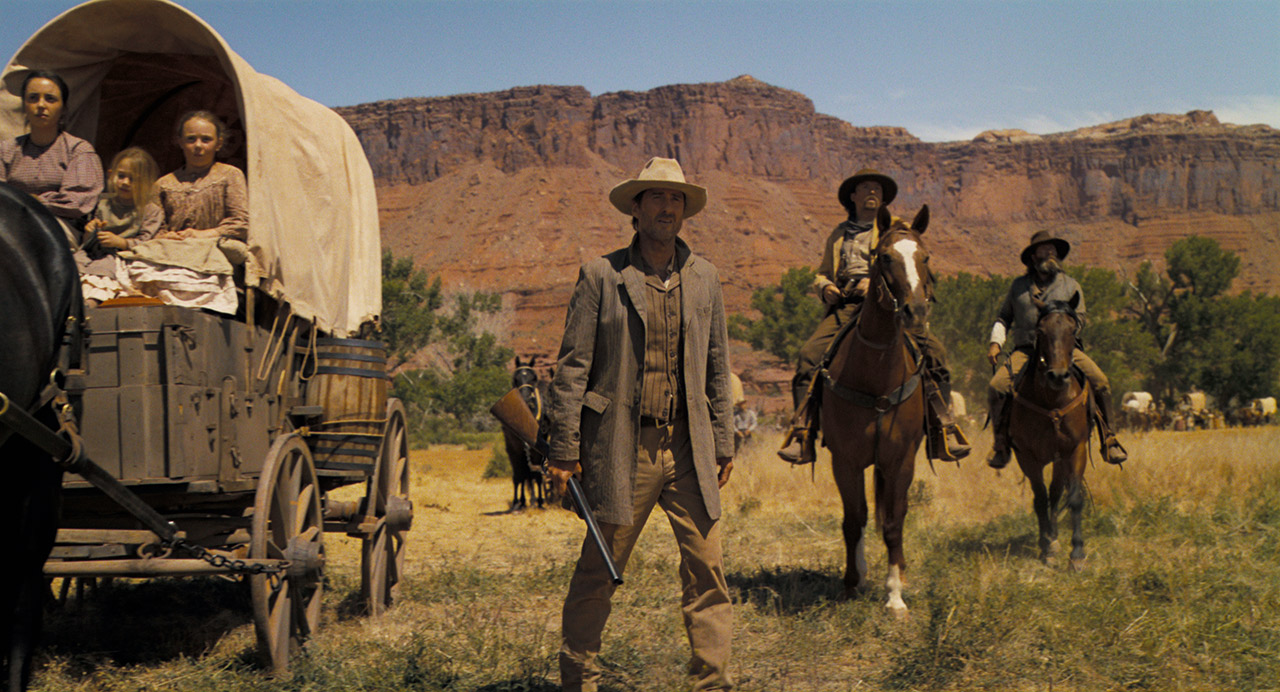Directed by Kevin Costner (also plays a character named Hayes Ellison), written by Jon Baird, Costner and Mark Kasdan, this Western of Westerns, the ultimate Wild West drama impresses right off the bat with how straight forward and confident it is about ambitions mentioned. Everything about it is as grandiose as it gets, as if someone at New Line Cinema and / or Warner Bros. had told Costner, “come at me with all you’ve got, guns blazing; let’s see what you’ve got, hotshot!” This sentiment is also reflected in a sort of toned down way in the performance of the Aussie model, actress and artist Abbey Lee, who in “Horizon” plays the character of Marigold; a woman, who makes her living as a, shall we say, artisan of intimacy in a town in Wyoming Territory after the Civil War.
The agility and emotional display Ms. Lee brings to her character in this movie is as unusual, unexpected even, as the screen time and the number of dialogues she gets. That certainly is different Abbey Lee from what I’ve seen before in "Old", "Elizabeth Harvest", "Lux Æterna", "The Neon Demon", "Mad Max: Fury Road", "The Dark Tower" and "Lovecraft Country" series. Everything about her character in “Horizon” is represented by speed: in intellect, decisions and body language.
What captivated me further regarding Marigold was how unexpectedly well-rounded she was. One might think there is little to no depth a character of sex worker in a movie can offer; Marigold proves otherwise. Soon after she is introduced to the viewer, there are strong hints at a strong-willed and resilient woman, who’s navigating the challenges of the American West with determination, adaptability and resourcefulness as she faces the trials and tribulations of the era.
The above weren’t the only reasons why Marigold’s character stood out almost instantly. Marigold seems to continue something like a trend in movies and series starring Costner. Be it the recent crime thriller “The Highwaymen” or “Yellowstone” series, or the 1990s Western classic “Dances with Wolves”, there are women near him, who are leading rather unusual, sometimes controversial lives that involve either aftermath of a tragedy or some ongoing dark struggles. In “Yellowstone” it’s Beth Dutton, struggling with relationships, alcohol and aggressive tendencies; in “The Highwaymen” it’s the ultra violent Bonnie Parker, leading life, shaped by persistent chronic pain while in “Dances with Wolves” it’s Christine Gunther – an orphan adopted by Native American tribe. So in light of all that can one blame me for wondering how much of Marigold had been written by Costner and how the character’s story would unfold in the future?
 Film still with Kevin Costner and Abbey Lee in "Horizon: An American Saga - Chapter 1". Source
Film still with Kevin Costner and Abbey Lee in "Horizon: An American Saga - Chapter 1". Source
“Horizon: An American Saga” is exactly what it says on the tin: people and their struggles in North America before states became states. The Chapter 1 has got multiple plotlines, beginning in different territories. The threads are likely to intersect in the future in Horizon – a town in San Pedro Valley, which at the present time in the movie still doesn’t exist. Nonetheless someone is printing and distributing leaflets about Horizon, a place where people supposedly can have a land and build their lives so that is why people just keep going there despite the fact the warriors from local Apache tribe keep evaporating, figuratively and literally, the dreams of newcomers. A larger scale demonstration of that is offered to the viewers early on in the movie with a lot of action: fighting and burning. In a way this part is like “flipping the bird” to the rule of thumb of having your big budget action piece as both, the Third Act and culmination in your screenplay, but “Horizon: An American Saga” is a different bird altogether: it is a mega project, consisting of numerous installments (the second one being released in August), using this prerogative blatantly and confidently. This aspect can have a dizzying and baffling effect at first with its unexpectedness, but I can definitely see how this could work rather well in the bigger picture later on, particularly when watching all the chapters one after the other. There is something even provocative in not just the confidence, that shows through so many aspects in this project, but also the vision that is there. “Horizon” doesn’t in any way hide the intentions to use all that as a means to impress and mesmerize. It is rather bold and clear about it. Let’s look at the list of the top cast members:
- Kevin Costner
- Sienna Miller (Victoria in “Stardust”, other credits include roles in “Casanova”, “American Sniper” and “High-Rise”)
- Sam Worthington
- Giovanni Ribisi (Pete Murphy in “Sneaky Pete” series, other credits include roles in “Avatar”, “Ted” and “Public Enemies”)
- Danny Huston (another actor from “Yellowstone” series, other credits include roles in “Succession” series, the movies “21 Grams” and “Big Eyes”)
- Abbey Lee
- Michael Rooker (Merle Dixon from “The Walking Dead” series, other credits include roles in “The Bone Collector”, “Fantasy Island” and “The Dark Tower”)
- Will Patton (another actor from “Yellowstone” series”, other credits include roles in “The Mothman Prophecies”, “Armageddon” and “Halloween”)
Looking at the list above, “Yellowstone” is very noticeable. Could that be a clue about why such a level of confidence from studios in “Horizon” project? Had “Yellowstone” prequel “1883” done rather well, indicating there is a market wanting this type of Western content? Hmm...
“Horizon: An American Saga” expands on various historical aspects of the time period in ways “1883” didn’t manage to. The new film series certainly proves there is still a lot that could be told and presented with higher level of granularity. Thus as much as it seems to be about ambition there, it has got substance to back that ambition up. The state supported policy of paying people for murdering members of certain other groups of people; the role of army in establishing settlements, and the limits of its reach; the ever uncertain and unsafe environment – everything is presented with palpable sense of intention to tell the viewer the story about how it really was yet never turning into a documentary. That line between historical accuracy and fiction had been treated with particular attention. It looks like it might have even been a thrilling challenge for the writers and director to see how historically accurate the fiction can get without turning into a documentary. Most of the time I as a viewer was happy to share that thrill. Not least because Kevin Costner’s directorial work with wide shots and perfect pacing in scenes is altogether unexpectedly stunning. My appreciation for a film like that stems from enjoying watching challenges people deal with in unfamiliar environments. Western expansion in North America is a perfect setting for my tastes in that sense. “Horizon” offers quite a lot of content for a curious soul like me. Especially a soul, who watched “1883” with the same level of interest. To some I may sound like a heretical puppet stating I believe that to be a great way to learn about, and understand the society in the United States, but the truth is, some of the aspects of being an immigrant resonate with me on a personal level, and unless you have that kind of life experiences, you are unlikely to be able to see movies like “Horizon: An American Saga” from my perspective. It is not about enjoying watching people struggle; this is about what resonates and why.
 Film still with Sienna Miller as Frances Kittredge in "Horizon: An American Saga - Chapter 1". Source
Film still with Sienna Miller as Frances Kittredge in "Horizon: An American Saga - Chapter 1". Source
There is a downside to mega projects like “Horizon”. Multiple plotlines mean an ever increasing probability of some themes and personal dramas not resonating with the viewer. This means the viewer would be sitting through some of the scenes, waiting for the story to get back to plotline that got them hooked. This definitely was the case with the viewer here. Was it the case of the writing in some scenes being weaker than others? Or simply themes not being interesting? (I’m thinking of the romantic spark between two of the lead characters there, which looked like written for the “Gone With the Wind” audience.) I don’t think there is a solution to an issue like that. Perhaps one day we would see in films like “Horizon: An American Saga” intertitles such as “now the intermission starts for those, who don’t expect this to be “Gone With the Wind” saga, so go get your bottle of cider, and be quick about it because Marigold’s gonna be back shortly” or "there's gonna be more of Jenna Malone's role in about ten minutes, so be quick about that cider", or "wonder what Dale Dickey is going to be dealing with in this movie? You've got ten minutes to be back to find out"... Yet, as the things stand, none of that is the case, so I don’t know – collectively demand for studios to post lists of plotlines on social media in the order of their appearance in the movie? Just throwing some ideas around.
Peer Ynt
📢 Instagram 📣 Steemit 📼 Hive 📺 Youtube 🎬 Publish0x 🎦

View or trade
BEER.BEERHey @peerynt, here is a little bit of from @isnochys for you. Enjoy it!BEER at dCity game to buy cards to rule the world.Did you know that <a href='https://dcity.io/cityyou can use
Thank you for your witness vote!
Have a !BEER on me!
To Opt-Out of my witness beer program just comment STOP below
Thank you for your witness vote!
Have a !BEER on me!
To Opt-Out of my witness beer program just comment STOP below